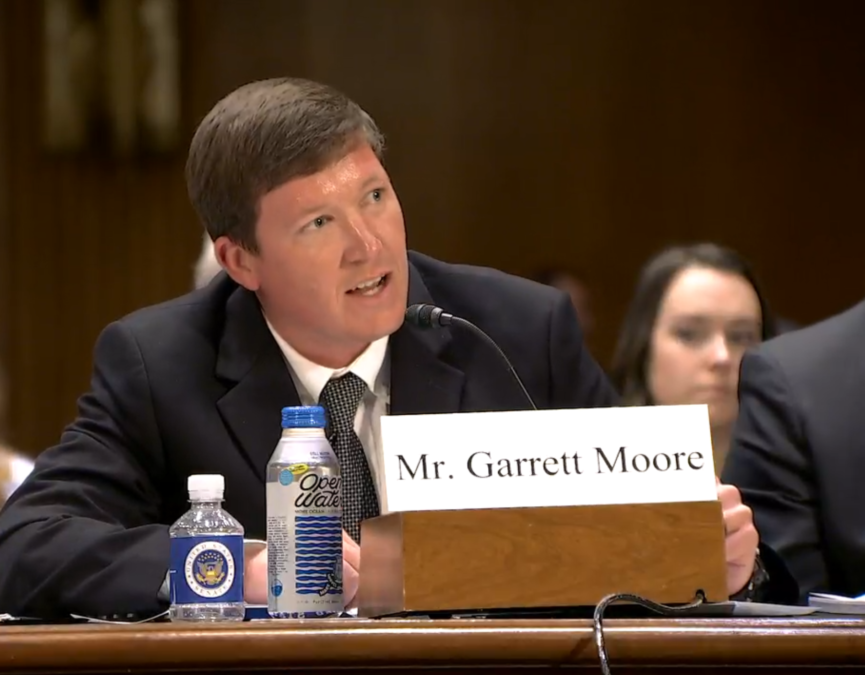Feb. 10, 2025, WASHINGTON, D.C. – The U.S. Senate Committee on Agriculture, Nutrition and Forestry held a hearing on February 5 titled “Perspectives from the Field: Farmer and Rancher Views on the Agricultural Economy, Part 1.” The U.S. Peanut Federation was honored to have representation by Garrett Moore of Moore Family Farm LLC in Chancellor, Alabama.
Moore’s testimony highlighted the struggles facing the peanut industry, including growers, shellers, and buying points. He outlined the major financial challenges over the past few years, including supply chain disruptions, labor shortages, inflation, non-tariff trade barriers and low market prices. Despite the recently passed economic assistance package, farmers will still face significant deficits, with input costs rising dramatically.
According to peanut economist Dr. Stanley Fletcher, Professor of Policy at the Center for Rural Prosperity and Innovation at Abraham Baldwin Agricultural College, the 2021 cost of production was $546.54 per ton, and reports the 2024 cost of production at approximately $656.80 per ton, a 20.17% percent increase over the course of three years.
During his testimony, Moore gave anecdotal evidence supporting the rising cost of production, stating, “On our farm alone, many of our expenses have almost doubled since 2018, and we are seeing no signs of relief in the cost of production area. For example, we need specific fertilizers to sustain nutrient levels in the soil, both for the peanuts we are growing and to protect the land for future crops. In the past few years, the significant increase in fertilizer costs has caused tough management decisions.”
Additionally, Moore emphasized the need for Congress to pass a new Farm Bill this year, and to include an increase in the reference price for the peanut Price Loss Coverage program (PLC) and a voluntary base update that will assist newer growing regions and younger growers.
“This testament to our current farm economy clearly conveys why we need a new Farm Bill. Peanut growers, shellers, and buying points all support the PLC program as included in the 2018 Farm Bill, but with a reference price increase. While the 2018 Farm Bill’s PLC program has been beneficial for peanut growers in the past, the rise in cost of production requires a reference price increase if this program is to remain relevant and valuable as a farm safety net,” Moore said.
“Additionally, the U.S. Peanut Federation supports a voluntary base update that includes growers with and without peanut base acres. While the 2014 Farm Bill allowed for base updating for peanut growers that already had base acreage on their farms, it excluded many young farmers and new production areas,” Moore added.
In closing, he stressed the importance of the peanut industry in the global food supply and urged continued support for farmers to ensure the future of agriculture.
“I am proud to be an American peanut grower and am thankful for the opportunity to contribute to our nation’s food supply. I hope to continue my family’s farm for a 5th generation, which cannot be done without increased support for our industry,” Moore said.
In addition to Moore, Mr. Zippy Duvall, President, American Farm Bureau Federation, and Mr. Rob Larew, President, National Farmers Union, also testified, as well as representatives from other commodities including cotton, corn, wheat, barley, sorghum, soybean, sugarbeet, and rice.
Watch the full hearing here.
###
The United States Peanut Federation (USPF) is comprised of the Southern Peanut Farmers Federation, the American Peanut Shellers Association, and the National Peanut Buying Points Association. USPF serves as a unified voice in Washington D.C. for all sectors of the peanut industry and advocates actively for strong agricultural policy. For additional information, contact Lorene Parker at (202) 543-7464 or by emailing lparker@reddingfirm.com.

